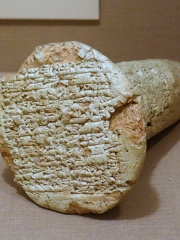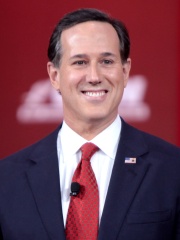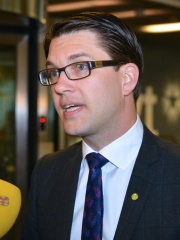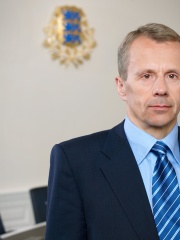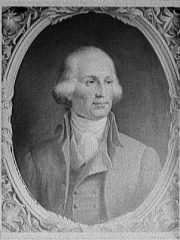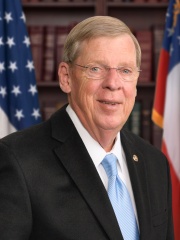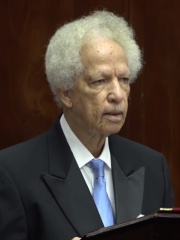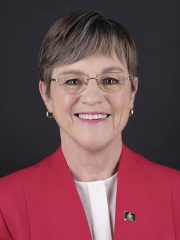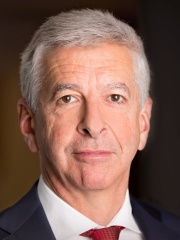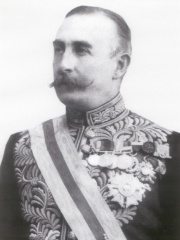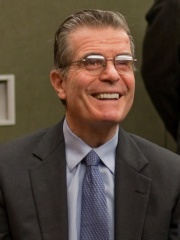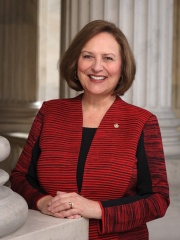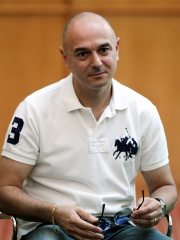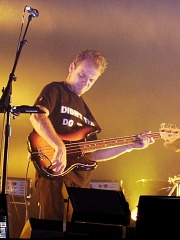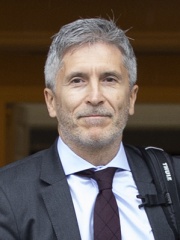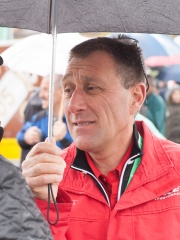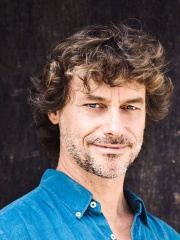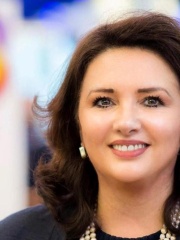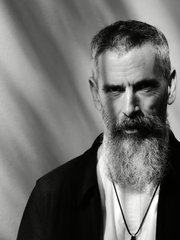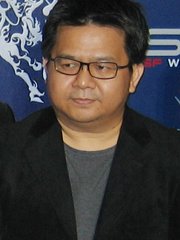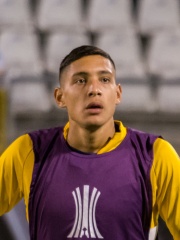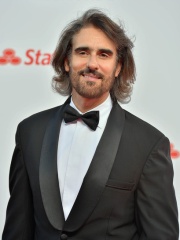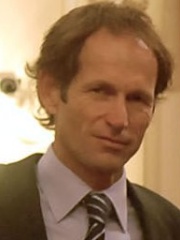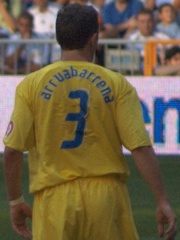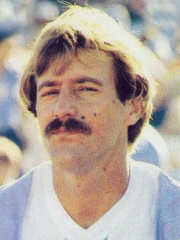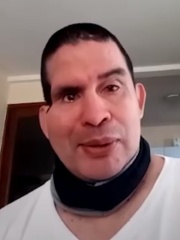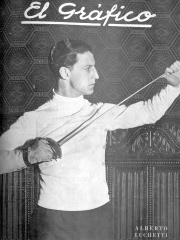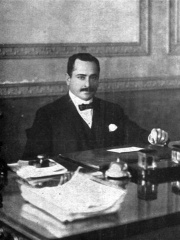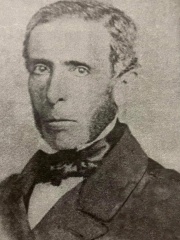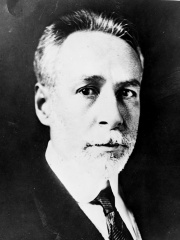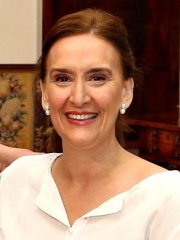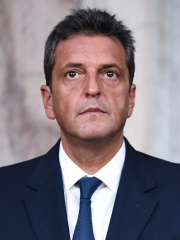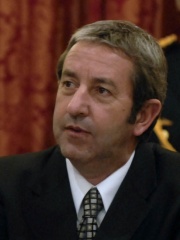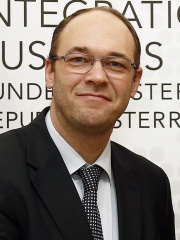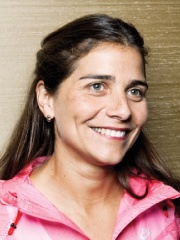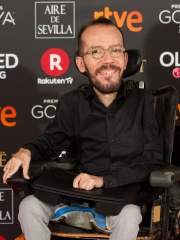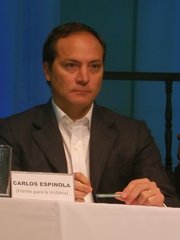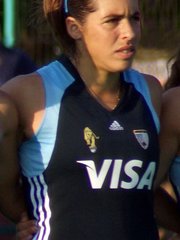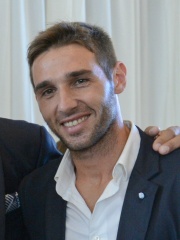Politician
Amado Boudou
1962 - today
EN.WIKIPEDIA PAGE VIEWS (PV)
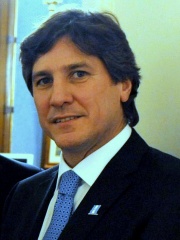
 Amado Boudou
Amado Boudou
Amado Boudou (Spanish pronunciation: [aˈmaðo βuˈðu] ; born 19 November 1962) is an Argentine economist and politician who served as the Vice President of Argentina from 2011 to 2015. He previously served as Minister of Economy from 2009 to 2011. In August 2018, following a lengthy investigation, he was convicted of corruption. He was then sentenced to five years and ten months in prison, and banned for life from holding public office. Read more on Wikipedia
His biography is available in 22 different languages on Wikipedia (up from 21 in 2024). Amado Boudou is the 17,583rd most popular politician (down from 16,883rd in 2024), the 679th most popular biography from Argentina (down from 652nd in 2019) and the 89th most popular Argentinean Politician.
Memorability Metrics
Page views of Amado Boudou by language
Among Politicians
Among politicians, Amado Boudou ranks 17,584 out of 19,576. Before him are Zambiya, Rick Santorum, Jimmie Åkesson, Jürgen Ligi, Samuel Osgood, Johnny Isakson, and Neville Cenac. After him are Laura Kelly, Ronald Plasterk, Gilbert Elliot-Murray-Kynynmound, 4th Earl of Minto, Ted Sorensen, and Deb Fischer.
Most Popular Politicians in Wikipedia
Go to all RankingsZambiya
HPI: 50.10
Rank: 17,584
Rick Santorum
1958 - Present
HPI: 50.09
Rank: 17,585
Jimmie Åkesson
1979 - Present
HPI: 50.08
Rank: 17,586
Jürgen Ligi
1959 - Present
HPI: 50.08
Rank: 17,587
Samuel Osgood
1747 - 1813
HPI: 50.08
Rank: 17,588
Johnny Isakson
1944 - 2021
HPI: 50.08
Rank: 17,589
Neville Cenac
1939 - Present
HPI: 50.07
Rank: 17,590
Amado Boudou
1962 - Present
HPI: 50.07
Rank: 17,591
Laura Kelly
1950 - Present
HPI: 50.07
Rank: 17,592
Ronald Plasterk
1957 - Present
HPI: 50.07
Rank: 17,593
Gilbert Elliot-Murray-Kynynmound, 4th Earl of Minto
1845 - 1914
HPI: 50.06
Rank: 17,594
Ted Sorensen
1928 - 2010
HPI: 50.05
Rank: 17,595
Deb Fischer
1951 - Present
HPI: 50.05
Rank: 17,596
Contemporaries
Among people born in 1962, Amado Boudou ranks 576. Before him are Daniel Levy, Guy Pratt, Fernando Grande-Marlaska, Charly Mottet, Alberto Angela, Helena Dalli, and Rolf Gölz. After him are Jane Sibbett, Nelson Gutiérrez, Christopher Chaplin, Abdulla Shahid, and Prachya Pinkaew.
Others Born in 1962
Go to all RankingsDaniel Levy
BUSINESSPERSON
1962 - Present
HPI: 50.21
Rank: 569
Guy Pratt
MUSICIAN
1962 - Present
HPI: 50.19
Rank: 570
Fernando Grande-Marlaska
POLITICIAN
1962 - Present
HPI: 50.19
Rank: 571
Charly Mottet
CYCLIST
1962 - Present
HPI: 50.17
Rank: 572
Alberto Angela
WRITER
1962 - Present
HPI: 50.15
Rank: 573
Helena Dalli
POLITICIAN
1962 - Present
HPI: 50.14
Rank: 574
Rolf Gölz
CYCLIST
1962 - Present
HPI: 50.13
Rank: 575
Amado Boudou
POLITICIAN
1962 - Present
HPI: 50.07
Rank: 576
Jane Sibbett
ACTOR
1962 - Present
HPI: 50.02
Rank: 577
Nelson Gutiérrez
SOCCER PLAYER
1962 - Present
HPI: 50.00
Rank: 578
Christopher Chaplin
COMPOSER
1962 - Present
HPI: 49.98
Rank: 579
Abdulla Shahid
POLITICIAN
1962 - Present
HPI: 49.94
Rank: 580
Prachya Pinkaew
FILM DIRECTOR
1962 - Present
HPI: 49.91
Rank: 581
In Argentina
Among people born in Argentina, Amado Boudou ranks 679 out of NaN. Before him are Nahuel Molina (1998), Miguel Varoni (1964), Nicolás González (1998), Fernando Cavenaghi (1983), Santiago Lange (1961), and Rodolfo Arruabarrena (1975). After him are José Van Tuyne (1954), Fernando Cáceres (1969), Cristian Ansaldi (1986), Lisandro Martínez (1998), Luis Lucchetti (1902), and Diego Placente (1977).
Others born in Argentina
Go to all RankingsNahuel Molina
SOCCER PLAYER
1998 - Present
HPI: 50.23
Rank: 673
Miguel Varoni
ACTOR
1964 - Present
HPI: 50.22
Rank: 674
Nicolás González
SOCCER PLAYER
1998 - Present
HPI: 50.18
Rank: 675
Fernando Cavenaghi
SOCCER PLAYER
1983 - Present
HPI: 50.17
Rank: 676
Santiago Lange
WRESTLER
1961 - Present
HPI: 50.15
Rank: 677
Rodolfo Arruabarrena
SOCCER PLAYER
1975 - Present
HPI: 50.08
Rank: 678
Amado Boudou
POLITICIAN
1962 - Present
HPI: 50.07
Rank: 679
José Van Tuyne
SOCCER PLAYER
1954 - Present
HPI: 50.07
Rank: 680
Fernando Cáceres
SOCCER PLAYER
1969 - Present
HPI: 50.00
Rank: 681
Cristian Ansaldi
SOCCER PLAYER
1986 - Present
HPI: 49.97
Rank: 682
Lisandro Martínez
SOCCER PLAYER
1998 - Present
HPI: 49.97
Rank: 683
Luis Lucchetti
ATHLETE
1902 - 1990
HPI: 49.96
Rank: 684
Diego Placente
SOCCER PLAYER
1977 - Present
HPI: 49.95
Rank: 685
Among Politicians In Argentina
Among politicians born in Argentina, Amado Boudou ranks 89. Before him are Luis Alberto Riart (1880), José María Linares (1808), Manuel Gondra (1871), Gabriela Michetti (1965), Sergio Massa (1972), and Julio Cobos (1955). After him are Davor Ivo Stier (1972), Cecilia Rognoni (1976), Pablo Echenique (1978), Carlos Espínola (1971), Claudia Burkart (1980), and Matías Paredes (1982).
Luis Alberto Riart
1880 - 1953
HPI: 54.20
Rank: 83
José María Linares
1808 - 1861
HPI: 54.09
Rank: 84
Manuel Gondra
1871 - 1927
HPI: 53.71
Rank: 85
Gabriela Michetti
1965 - Present
HPI: 52.07
Rank: 86
Sergio Massa
1972 - Present
HPI: 51.80
Rank: 87
Julio Cobos
1955 - Present
HPI: 51.28
Rank: 88
Amado Boudou
1962 - Present
HPI: 50.07
Rank: 89
Davor Ivo Stier
1972 - Present
HPI: 43.47
Rank: 90
Cecilia Rognoni
1976 - Present
HPI: 41.77
Rank: 91
Pablo Echenique
1978 - Present
HPI: 40.18
Rank: 92
Carlos Espínola
1971 - Present
HPI: 39.08
Rank: 93
Claudia Burkart
1980 - Present
HPI: 38.16
Rank: 94
Matías Paredes
1982 - Present
HPI: 37.35
Rank: 95
